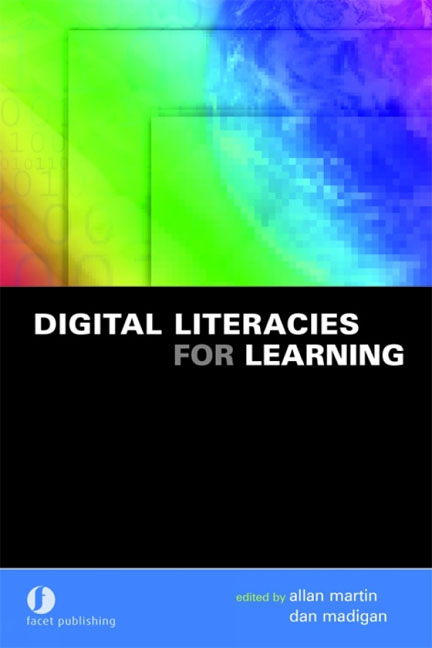Book contents
- Frontmatter
- Contents
- Dedication
- The contributors
- Foreword
- Preface
- Part I Literacies in the digital age
- 1 Literacies for the digital age: preview of Part 1
- 2 Learners, learning literacy and the pedagogy of e-learning
- 3 Real learning in virtual environments
- 4 Digital fusion: defining the intersection of content and communications
- 5 Literacy and the digital knowledge revolution
- 6 Understanding e-literacy
- 7 Information literacy – an overview
- 8 Contemporary literacy – the three Es
- 9 Reconceptualizing media literacy for the digital age
- 10 Literacy, e-literacy and multiliteracies: meeting the challenges of teaching online
- 11 Graduate e-literacies and employability
- Part II Enabling and supporting digital literacies
- Index
5 - Literacy and the digital knowledge revolution
from Part I - Literacies in the digital age
Published online by Cambridge University Press: 08 June 2018
- Frontmatter
- Contents
- Dedication
- The contributors
- Foreword
- Preface
- Part I Literacies in the digital age
- 1 Literacies for the digital age: preview of Part 1
- 2 Learners, learning literacy and the pedagogy of e-learning
- 3 Real learning in virtual environments
- 4 Digital fusion: defining the intersection of content and communications
- 5 Literacy and the digital knowledge revolution
- 6 Understanding e-literacy
- 7 Information literacy – an overview
- 8 Contemporary literacy – the three Es
- 9 Reconceptualizing media literacy for the digital age
- 10 Literacy, e-literacy and multiliteracies: meeting the challenges of teaching online
- 11 Graduate e-literacies and employability
- Part II Enabling and supporting digital literacies
- Index
Summary
Abstract
Although literacy is based on mastering a series of technical and cultural skills, such as reading, writing, numeracy and media proficiency, these skills do not in themselves amount to literacy. As research increasingly shows, literacy is fundamentally situated and determined by the cultural, political and historical contexts of the communities in which it is activated. However, with the new digital knowledge contexts within which 21st century skills are being deployed, literacy (and therefore education) is facing a major challenge. The evolving digital technologies are not only transforming access, they are also fostering new approaches to knowledge, new knowledge architectures, new knowledge ethics, and new accountability requirements and assessments. These emerging issues for education will be described as part of the ongoing digital knowledge revolution.
Introduction
With the ongoing transition towards the knowledge society, new expectations are challenging educational workers. The methods or ways of learning and acquiring knowledge are changing, the learning environment is changing, the timespan of learning is expanding, and even the aims and content of learning are changing. When confronted with change, it is most important to have identified landmarks. The global socio-economic transformation we are experiencing today has brought information, knowledge and innovation as the main sources of economic growth and employment opportunities. Consequently, education will be increasingly challenged to meet the new requirements of knowledge society workers and citizens. Refocusing on literacy as the programmatic educational goal is presented here as a means to establish landmarks in order to address the ‘tectonics of educational change’ (Tuomi, 2005) that the knowledge revolution is bringing about.
Rethinking literacy
Although literacy is based on mastering a series of technical and cognitive skills, such as reading, writing, numeracy and media proficiency, these skills in themselves only partly account for literacy. As brought forth more and more by research, literacy is fundamentally situated and determined by the cultural, political and historical contexts of the communities in which it is activated. It is recognized today that literacy not only entails linguistic and social embeddedness, but also that it is a continuum of multiple levels and that, ultimately, it points to one's cultural identity. This deep cultural process is today pressed forward by the growing opportunities that technological tools allow in interacting with information and knowledge.
- Type
- Chapter
- Information
- Digital Literacies for Learning , pp. 51 - 67Publisher: FacetPrint publication year: 2006
- 4
- Cited by



